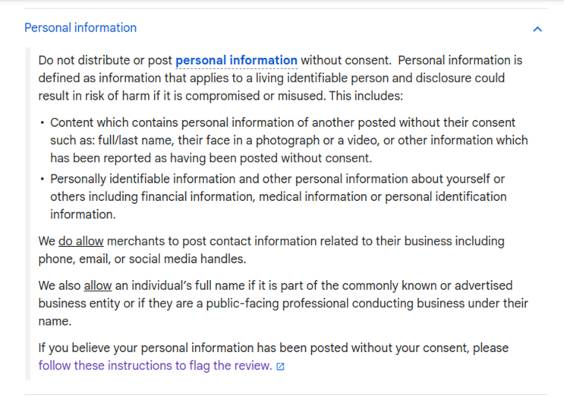In a proactive move last month, Google rolled out noteworthy updates to its Maps User Contributed Content Policy, sharpening its focus on prohibited & restricted content. If you rely on Google Maps for your business, it’s vital to be abreast of these changes. Let’s delve deeper:
Cracking Down on Fake Engagement:
Google is reinforcing its commitment to genuine user interaction. The updated policy now puts a spotlight on content posted via emulators, modified operating systems, or any tactics designed to simulate real engagement. In essence, the goal is to deter any activity that manipulates sensor data, aims to befuddle standard operations, or imitates genuine engagement.
Emphasizing Personal Data Protection:
The ‘Personal Information’ section has been meticulously revamped. The core directive is unambiguous: Refrain from distributing or posting personal information without explicit consent. The policy clearly defines personal information and the potential risks associated with its unauthorized disclosure. On a brighter note, merchants can still showcase their phone, email, or social media handles. Furthermore, if an individual’s full name is linked to a widely recognized or advertised business entity, or they’re a public-facing professional, it’s permissible to display their name. Here’s a screenshot of that entire section:

Thorough Review Process:
Google isn’t just setting the rules; they’re actively monitoring adherence. Their review process is comprehensive, evaluating not only the content but also account information, user actions, potential patterns of detrimental behavior, and more. This is backed by both user-reported issues and Google’s proactive reviews.
Consequences of Non-compliance:
The stakes are high! Google’s message is resonant – compliance is non-negotiable. If a Google Maps user’s activities, either on or off the platform, jeopardize the well-being of users, the community, or Google’s workforce, repercussions can range from account suspensions to outright terminations.
To Sum It Up:
Google’s renewed commitment to genuine engagement and rigorous personal data protection is evident. As businesses navigate this digital terrain, aligning with these updated policies is not just recommended; it’s imperative. For those who spot potential personal information breaches, Google has streamlined the process to flag such reviews.